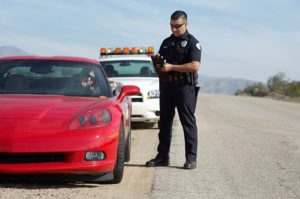Contesting a Traffic Ticket: Questions and Answers
 Wherever you see automotive traffic, you may also see a police officer writing a ticket for some driver who apparently committed some sort of violation. Traffic tickets may help to discourage reckless driving and accidents, but in some cases the driver may have justification for fighting the violation in court.
Wherever you see automotive traffic, you may also see a police officer writing a ticket for some driver who apparently committed some sort of violation. Traffic tickets may help to discourage reckless driving and accidents, but in some cases the driver may have justification for fighting the violation in court.
If you find yourself sitting in the driver’s seat as a police officer writes you a traffic ticket, you may wonder how (or whether) you can contest it instead of paying a hefty fine and watching your auto insurance rates go up. The following questions and answers may help you understand your legal options and strategies in these situations.
What Violations Can Result in a Ticket?
Traffic violations in North Carolina fall into two primary categories: non-moving violations and moving violations. Non-moving violations include parking illegally, using old or expired license plates instead of valid ones, and leaving a vehicle unattended with the motor running.
Moving violations include the wide range of offenses you might commit while actually driving your vehicle. Common examples include running a red light, making an illegal turn, and exceeding the speed limit. Operating a vehicle while under the influence of drugs or alcohol also counts as a moving violation.
Why Should You Contest a Traffic Ticket?
Many drivers might see going to court and contesting a traffic ticket as too much trouble to bother with. However, these violations can cause considerable trouble on their own, from the fines you might have to pay and the higher premiums your insurance provider may impose to the risk of losing your driving privileges altogether.
Like many states, North Carolina uses a point system to keep track of a driver’s traffic violations, with different point values assigned to different types of violations. If you accumulate 12 traffic violation points within a three-year period, the court can suspend your driver’s license for up to one full year.
How Might You Get Tickets Dismissed or Reduced?
A variety of defense strategies and tactics may lead to your getting a traffic violation dismissed or at least receiving a reduced penalty. A simple appearance in traffic court for your trial could even get your case dismissed if the officer issuing the ticket cannot attend. However, you probably shouldn’t count on the officer’s unavailability.
Your attorney may request discovery of evidence to help determine what kind of case the authorities have against you, along with the strength of their argument. The evidence in questions may include radar-based speed measurements, notes taken at the scene, and any other documentation that might reveal inconsistencies or inaccuracies.
You and your attorney may also use other evidence gathered at the scene to support your case. Examples of such evidence could include eyewitness testimony in your favor, diagrams of the area where the alleged violation took place, and photos or videos revealing whatever other details support your side of the story.
Another legal defense strategy invokes something called mistake of fact. Mistake of fact differs from ignorance of the law (which doesn’t excuse defendants in such cases). It means that some error prevented you from recognizing your error, such as faded lane dividers or an obscured warning sign that you simply couldn’t see.
Even if you knowingly committed a traffic violation, you may have had a legitimate reason to do so. For instance, if a child running after a ball stepped into your lane, you may have had no choice but to swerve into oncoming traffic or onto a sidewalk. In this case, safety considerations may outweigh the letter of the law.
If you want to fight back against a recent traffic ticket, you don’t have to go it alone. Carl L. Britt Jr. Attorney at Law has the necessary experience, skills, and legal insights to advise you every step of the way and help you mount the most credible defense possible. Contact our law office today to tell us about your case.
